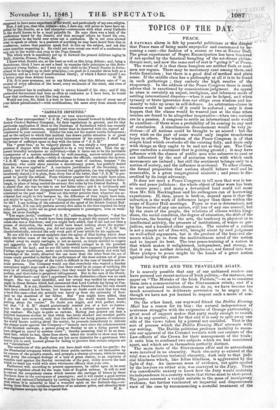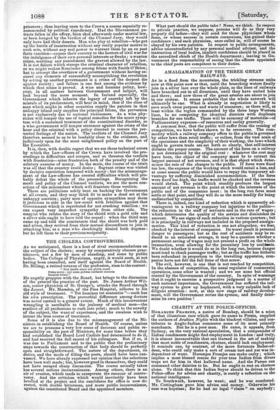THE SATYR AND THE TRAVELLER AGAIN.
IT is scarcely possible that any of our unbiassed readers can have perused our recent notices of Irish politics,—for instance, our paper on "The Mistake of the Irish Patriots,"—so as to construe them into a commendation of the Slievanamon rebels; and if a few not unbiassed readers choose to do so, we have become too much accustomed to deliberate perversion to be angry at it, though we have not yet learned to respect such a mode of con- troversy. On the other hand, our wayward friend the Dublin Evening Mail has a reason for its bias : the natural independence of acuteness struggles with the exigencies of Orange partisanship ; great need of support makes that party ready enough to snatch at it in any quarter ; and for that end it is easy to split away one side of the views taken by a journal not onesided. That is the- sort of process which the Dublin Evening Mail attempts with our writing. The Dublin politician professes inability to recon- cile our approval of the Clonmel verdicts with our censure of the Law-officers of the Crown for their management of the trials: it suits him to confound two subjects which we had considered apart, and which are in themselves perfectly distinct. The main facts of the Slievanamon affair and its antecedents were involved in no obscurity. Such obscurity as existed at the trial was a factitious technical obscurity, dark only to that judi- cial blindness which, like feline blindness, is aggravated by the light of day. An immense mass of evidence, not quite spoiled by the lawyers on either side, was conveyed to the Jury. There was considerable anxiety to know how the Jury would maintain its independence in a country where that virtue must be shot- proof. The jurors returned a verdict suitable to the mass of inculpatory, evidence, but further vindicated an impartial and dispassionate view of the case by recommending a merciful treatment of the
prisoners ; thus leaving open to the Crown a course especially re- commended by political expediency. Had the Slievanamon pa- triots fallen in the affray, been shot afterwards under martial law, or been hanged by the verdict of the Clonmel Jury, they would only have had their deserts. Men who play at rebellion—who get up the bustle of insurrection without any really popular motive to such acts, without any real power to warrant them by an ex post facto sanction—expose their country to the horrors of civil war for the indulgence of their own personal interests or freaks ; a wanton crime, meriting any punishment the gravest allowed by the law. It is not failure which stamps the criminal character of rebellion, or we might reckon Kosciusko among felons with Smith O'Brien; but to attempt the overthrow of a government without having se- cured any elements of successfully accomplishing the revolution by setting up another government is a crime of the deepest die against society ; and failure is one fact among the evidence by which that crime io proved. A wise and humane policy, how- ever, in all matters between Government and subject, will look beyond the mere moment. In Ireland especially, the Government which inherits the legacy of anarchy left by the misrule of its predecessors, will bear in mind, that if the class of men which might in other countries supply the patriots in that unhappy island only supplies the principal felons, the perversion is not exclusively due to national viciousness. As a wise phy- sician will temper the use of topical remedies for the acute symp- tom with a sustained treatment of the constitutional disorder, so a wise government will temper sternness against the crime of the hour and the criminal with a policy directed to restore the per- verted feelings of the nation. The verdicts of the Clonmel Jury therefore seemed to us to be laudably close to the evidence, and judiciously open for the most enlightened policy on the part of the Executive.
It is, then, with double regret that we see those technical errors by which the Law-officers of the Crown have involved the pro- ceedings in difficulties and scrapes, and so threaten the verdicts with frustration—utter frustration both of the penalty and of the salutary exercise of mercy. In the main, the course of the trials was all that the country could desire ; flagrant crime was visited by decisive conviction tempered with mercy : but the mismanage- ment of the Law-officers has created difficulties which will pro- bably defeat the whole of the proceedings. Recognizing the merit and policy of the Clonmel verdicts, we are the more con- scious of the misconduct which will frustrate those verdicts.
There are politicians solely bent on backing the Government at all events, and they may think fit to make a dead set at the unhappy convicts ; party men of opposite sympathies may deem it judicious to side in the law-court with rebellion against that Government which is reprobated for not crushing rebellion : we can expect very imperfect sympathy from either side. The essayist who relates the story of the shield with a gold side and a silver side ought to have told the sequel : when the third man came up and told the combatants that the shield was both gold and silver, they revived from their mutual discomfiture to join in attacking him, as a man who shockingly denied both dogmas : but he left them to their previous reciprocity.



























 Previous page
Previous page